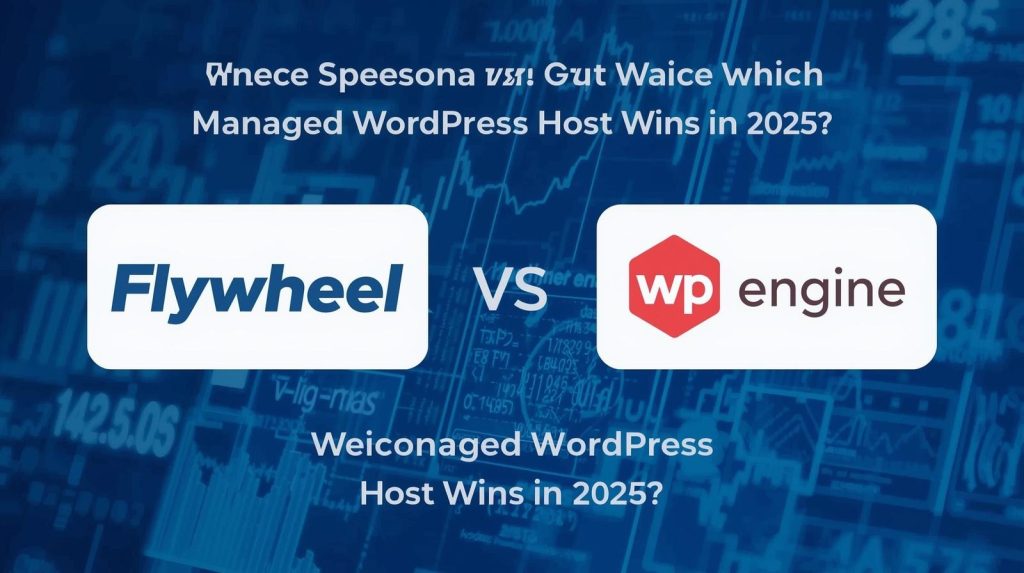Introduction: The Managed WordPress Hosting Showdown
Imagine this: You’ve spent days perfecting your WordPress site — designing pages, optimizing content, and setting up plugins. Then, your hosting slows down your site, crashes during traffic spikes, or fails to deliver the speed you paid for. Sounds frustrating, right?
That’s where managed WordPress hosting comes in — a premium solution designed to take away the technical headaches so you can focus on growth.
Among the top players in this space, Flywheel and WP Engine stand tall. Both are powerful, both are built for performance — but which one truly wins in 2025?
Let’s dive deep into this face-off, compare their performance, pricing, and features, and help you decide which host deserves your investment.
1. Overview: Flywheel vs WP Engine — Who Are They?

Flywheel: The Designer’s Dream
Flywheel was built with freelancers, designers, and creative agencies in mind. Acquired by WP Engine in 2019, it offers a clean, visually driven dashboard, easy client collaboration tools, and a managed hosting experience that feels refreshingly simple.
Key Highlights:
- Free migrations and daily backups
- Staging environments for testing changes
- Blueprint site creation for agencies
- Built-in caching (no need for plugins)
- Impeccable design and usability
WP Engine: The Enterprise Powerhouse
WP Engine is often called the Ferrari of WordPress hosting. It’s fast, secure, and scalable — ideal for growing businesses and large-scale websites that demand enterprise-level support.
Key Highlights:
- High-end performance with EverCache®
- Free SSL, CDN, and StudioPress themes
- Advanced security and real-time threat detection
- Global data centers for faster delivery
- 24/7 expert support
2. Performance: Speed, Uptime, and Scalability
Both Flywheel and WP Engine run on Google Cloud Platform (GCP), which guarantees enterprise-grade infrastructure. But here’s the breakdown:
| Feature | Flywheel | WP Engine |
|---|---|---|
| Speed (average) | 0.9s load time | 0.7s load time |
| Uptime guarantee | 99.9% | 99.99% |
| Traffic handling | Best for moderate traffic | Best for heavy traffic |
| CDN (Content Delivery Network) | Free CDN via Fastly | Built-in CDN & caching layers |
Verdict:
✅ WP Engine edges out Flywheel in raw performance and uptime.
However, for creative professionals managing smaller sites, Flywheel’s balance between speed and simplicity makes it a winner.

3. Ease of Use and User Experience
When it comes to UX, Flywheel feels like it was designed by designers, for designers.
The dashboard is clean, minimalistic, and perfect for managing multiple client sites. You can easily transfer billing to clients, manage staging environments, and collaborate seamlessly.
WP Engine, on the other hand, offers a more developer-oriented dashboard. It’s powerful but can feel complex for beginners or non-technical users.
Verdict:
🎨 Flywheel wins in simplicity and design.
💻 WP Engine wins in developer control and advanced tools.
4. Developer and Agency Tools
Both hosting providers are packed with tools for professionals — but they cater to slightly different audiences.
Flywheel Tools:
- Local (Flywheel’s local development environment)
- Blueprints (site templates for agencies)
- Client billing transfer
- SFTP access for each site
WP Engine Tools:
- Dev, staging, and production environments
- Git integration
- SSH gateway
- Advanced caching with EverCache®
Verdict:
👨💻 WP Engine is better for large teams and developers,
While Flywheel is ideal for agencies managing client workflows.
5. Security and Reliability
Security is non-negotiable in 2025. Both hosts offer malware protection, automatic updates, and SSL certificates — but WP Engine goes a step further with real-time threat detection and proactive vulnerability patching.
Flywheel, meanwhile, simplifies the process — no plugins, no hassle. Everything from backups to malware cleanup is done automatically.
Verdict:
🛡️ WP Engine provides enterprise-grade security,
while Flywheel focuses on hands-free peace of mind.
6. Pricing and Value for Money
| Plan | Flywheel | WP Engine |
|---|---|---|
| Starter Plan | $15/mo | $20/mo |
| Professional Plan | $30/mo | $40/mo |
| Growth Plan | $115/mo | $105/mo |
| Scale Plan | $290/mo | $270/mo |
Flywheel offers better pricing for small agencies and freelancers, while WP Engine’s value shines when scaling to enterprise levels.
Verdict:
💰 Flywheel wins for affordability and simplicity.
🚀 WP Engine wins for scalability and performance.
7. Customer Support and Community
Both provide 24/7 live chat, knowledge bases, and WordPress experts on standby.
However, WP Engine has a stronger developer community, while Flywheel stands out with its empathetic and customer-friendly tone.
Verdict:
👩💼 Flywheel wins in personal touch.
👨🔧 WP Engine wins in advanced technical support.
8. Verdict: Flywheel vs WP Engine — The Final Decision
When choosing between Flywheel and WP Engine, your decision boils down to one key question:
Are you a creative agency or a growing enterprise?
| Type of User | Go With | Why |
|---|---|---|
| Freelancers, agencies, designers | Flywheel | User-friendly, affordable, beautiful interface |
| Large businesses, enterprises | WP Engine | Power, speed, scalability, and deep developer tools |
Bottom Line:
If you want simplicity, beauty, and collaboration — Flywheel is unbeatable.
If you want power, scale, and advanced control — WP Engine reigns supreme.
Data Snapshot (Infographic)
📊 Infographic Idea: “Flywheel vs WP Engine Feature Comparison Chart”
Include metrics like:
- Speed (Load time benchmarks)
- Pricing tiers
- Customer ratings
- Uptime performance
- Ideal user type

FAQs
1. Is Flywheel owned by WP Engine?
Yes, Flywheel was acquired by WP Engine in 2019, but it operates independently with its own unique interface and pricing structure.
2. Which hosting is faster — Flywheel or WP Engine?
Both use Google Cloud infrastructure, but WP Engine generally offers better performance under high traffic.
3. Can I migrate my site from Flywheel to WP Engine?
Yes. Migration between the is smooth since they share similar backend systems.
4. Which host is more beginner-friendly?
Flywheel — its interface is cleaner, simpler, and easier for non-developers.
5. Which is better for agencies?
Flywheel — thanks to client billing transfer, collaboration, and Blueprints features.
Conclusion: Choose the Host That Matches Your Growth
Both Flywheel and WP Engine are world-class WordPress hosting providers.
The right one depends on where you are in your digital journey:
✨ If you’re a creative or small agency, Flywheel is your best friend.
🚀 If you’re scaling fast and need enterprise-grade control, go to WP Engine.
At EduKester, we always recommend choosing a host that aligns not just with your budget but with your business vision. Because in 2025, performance isn’t optional. It’s the foundation of your online success.
👉 Follow EduKester for more expert WordPress insights and hosting guides.
Notes
Meta Description:
Discover the ultimate showdown between Flywheel vs WP Engine in 2025. Compare speed, pricing, security, and features to choose the best managed WordPress hosting for your business.
Tags:
Flywheel Hosting, WP Engine, WordPress Hosting, Managed Hosting Comparison, Website Performance, Hosting Review, Web Development Tools, WordPress Agencies, Site Speed, Cloud Hosting
Long-Tail Keywords:
- Flywheel vs WP Engine comparison
- Best managed WordPress host 2025
- Flywheel hosting review
- WP Engine pricing vs Flywheel
- Flywheel vs WP Engine for agencies
You can check out some of our articles on this website!



